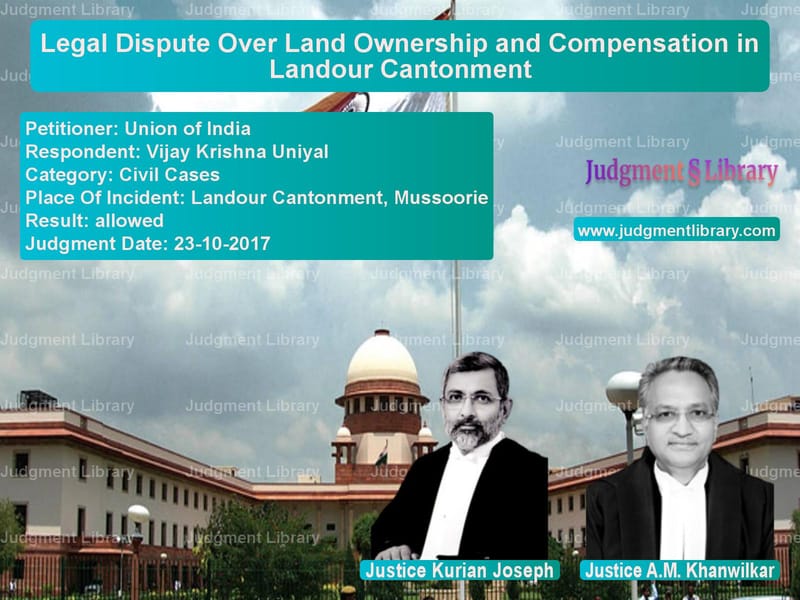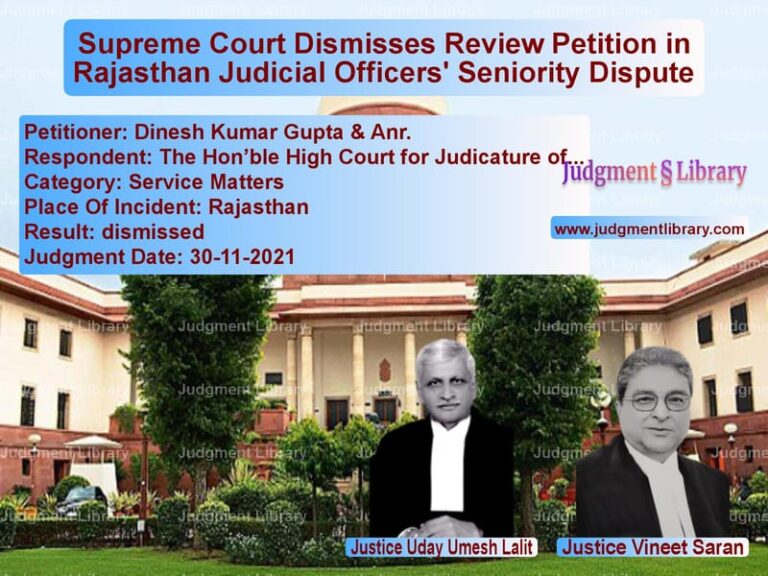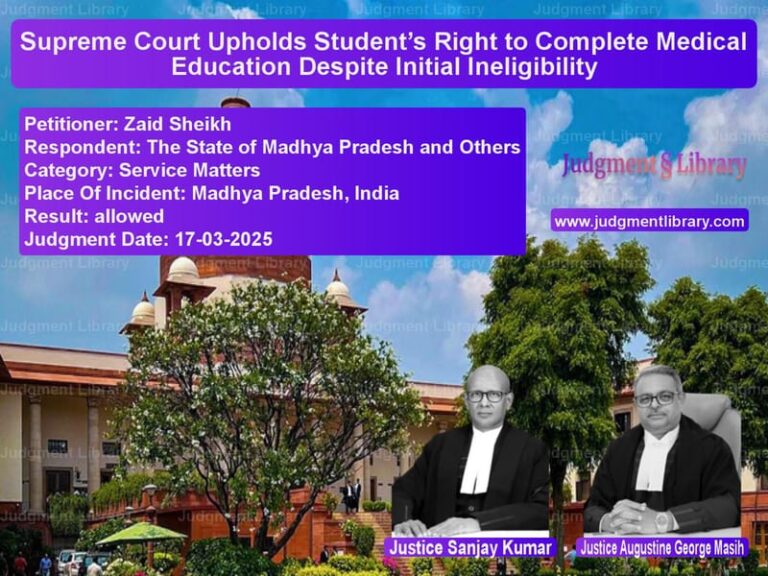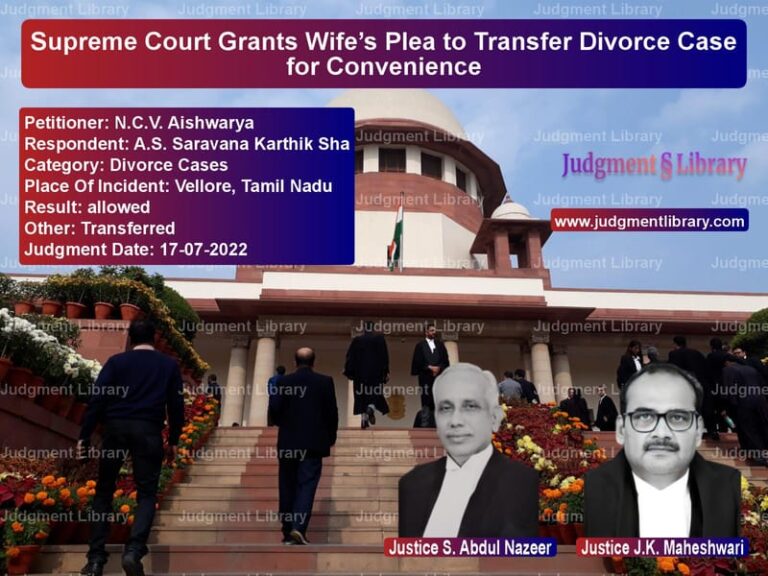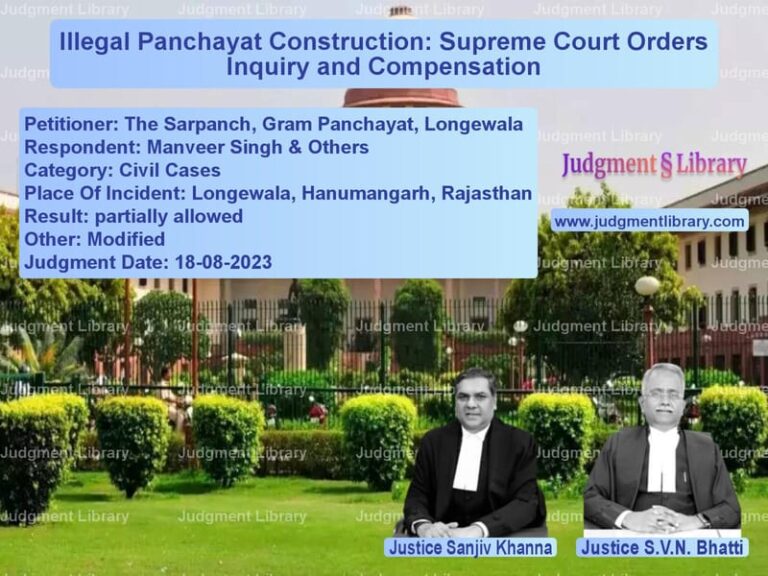Legal Dispute Over Land Ownership and Compensation in Landour Cantonment
The case at hand involves an extensive legal dispute regarding the ownership and possession of a piece of land situated in the Landour Cantonment area of Mussoorie, India. The case reached the Supreme Court after multiple appeals, with the central issue revolving around the validity of a notice issued by the Government of India for resuming the land in question, as well as the rights of the occupant, Vijay Krishna Uniyal, over the property.
The original respondent, Vijay Krishna Uniyal, was the occupant of a piece of land known as Wolfsburn Estate, situated at Survey No.11, Landour Cantonment, Mussoorie. The land, measuring 3.398 acres, had been in Uniyal’s possession under what is known as an ‘Old Grant’ from the Government. However, the Government sought to resume the property in 1985, citing its right to do so under the Old Grant regulations, which were part of the legal framework established during British rule.
On August 19, 1985, the Under Secretary to the Government of India issued a notice informing Uniyal that the Government intended to resume the property. The notice also offered him compensation for the structures standing on the land, amounting to Rs. 17,275. The notice explicitly stated that the land and the trees on it belonged to the Government, and it demanded that Uniyal vacate the land within one month. This notice led to the filing of a suit by Uniyal, in which he sought a permanent injunction to prevent his eviction and, alternatively, a determination of reasonable compensation for the property.
Uniyal’s main argument in the suit was that he was the absolute owner of the land due to a registered sale deed he had acquired in 1980. He argued that the Government’s claim to the property was invalid, as he had full ownership rights over the land based on his long-standing possession. He also claimed that his possession of the property for over 60 years had resulted in adverse possession, granting him ownership.
In response, the appellant, Union of India, denied the claim of ownership and argued that Uniyal only held occupancy rights on the land under the Old Grant. The appellant contended that the land belonged to the Government, and Uniyal’s possession was limited to the occupancy granted to him under the terms of the Old Grant. The Government further stated that the land could be resumed at any time under the provisions of the grant.
The trial court initially dismissed Uniyal’s suit, finding that the land indeed belonged to the Government and that Uniyal had no claim to ownership. The trial court also determined that the Government had the right to resume the property and that Uniyal was entitled only to compensation for the structures built on the land, not for the land itself. This decision was upheld by the appellate court, which also ruled that Uniyal’s claim to ownership was not valid.
However, Uniyal appealed the decision to the High Court of Uttarakhand. The High Court, while agreeing with the lower courts’ findings on the issue of ownership, left open the question of whether the compensation offered by the Government was adequate. The High Court also stated that Uniyal could contest the issue of ownership in any future eviction proceedings. Despite these observations, the High Court dismissed the second appeal, finding that it lacked merit.
The Union of India, dissatisfied with the High Court’s handling of the case, filed an appeal in the Supreme Court. The main contention of the appellant was that the High Court’s observations, particularly those in paragraphs 17 and 18 of the judgment, undermined the concurrent findings of fact made by the trial and appellate courts. These findings, according to the appellant, had clearly established the Government’s ownership of the land and Uniyal’s lack of any claim to ownership.
The Supreme Court considered the arguments put forth by both parties and reviewed the legal aspects of the case. The Court found that the High Court’s observations regarding the potential reopening of the ownership issue were misplaced. The Court emphasized that the issue of ownership had already been adjudicated upon and that the lower courts’ findings should not be disturbed. The Court also noted that Uniyal’s claim to ownership based on adverse possession was not valid, as the Government’s rights over the land were well established under the Old Grant regulations.
The Court further clarified that the issue of compensation for the structures on the land should be handled separately, and the determination of reasonable compensation could be made in accordance with the relevant laws. The Supreme Court ruled that the appellant (Union of India) was entitled to take possession of the land in question, but it granted Uniyal time until January 31, 2018, to vacate the property. The Court also stated that Uniyal could pursue legal remedies if he had any grievances regarding the quantum of compensation to be paid for the structures.
The judgment ultimately clarified that the observations made by the High Court regarding ownership could not stand, as they had the potential to reopen an already settled issue. The Supreme Court’s ruling, therefore, underscored the binding nature of the concurrent findings of the lower courts on the issue of ownership, effectively closing the door on any further challenges to the ownership of the land.
In conclusion, the Supreme Court allowed the appeal of the Union of India, set aside the observations made by the High Court in paragraphs 17 and 18 of the judgment, and confirmed the Government’s right to resume the land under the terms of the Old Grant. The decision also highlighted the procedural aspects of determining compensation for structures on the land, ensuring that the parties could seek appropriate remedies within the framework of the law.
Don’t miss out on the full details! Download the complete judgment in PDF format below and gain valuable insights instantly!
Download Judgment: Union of India vs Vijay Krishna Uniyal Supreme Court of India Judgment Dated 23-10-2017.pdf
Direct Downlaod Judgment: Direct downlaod this Judgment
See all petitions in Contract Disputes
See all petitions in Landlord-Tenant Disputes
See all petitions in Specific Performance
See all petitions in Judgment by Kurian Joseph
See all petitions in Judgment by A M Khanwilkar
See all petitions in allowed
See all petitions in supreme court of India judgments October 2017
See all petitions in 2017 judgments
See all posts in Civil Cases Category
See all allowed petitions in Civil Cases Category
See all Dismissed petitions in Civil Cases Category
See all partially allowed petitions in Civil Cases Category

